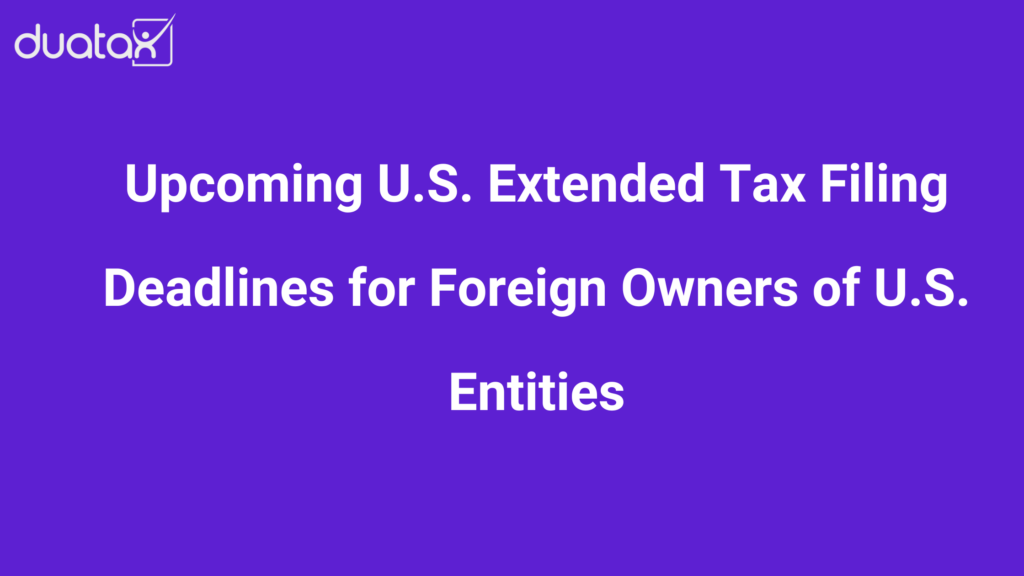Upcoming U.S. Extended Tax Filing Deadlines for Foreign Owners of U.S. Entities

Navigating the U.S. tax system can be challenging, especially for non-U.S. residents and foreign owners of U.S. entities. With the 2024 extended tax deadlines approaching, it’s essential to stay informed and prepared. This article will guide you through the critical dates, explain the penalties for late filing, and provide a detailed filing guide specifically for foreign owners of U.S. entities.
Key Tax Filing Deadlines 📅
If you extended your tax return earlier this year, here are the important deadlines to keep in mind:
- Partnerships: September 15, 2024
- C-Corporations: October 15, 2024
- Individual Returns (including single-member LLCs): October 15, 2024
Missing these deadlines isn’t just an inconvenience. It can lead to severe penalties that could seriously impact your finances. The IRS doesn’t play around when it comes to late filings.
But don’t worry. We’ve got your back. We’re going to walk you through a comprehensive checklist designed to help you navigate these deadlines and avoid costly mistakes. By the end, you’ll have a clear roadmap to ensure your U.S. tax compliance is on point.
Understanding Penalties
The U.S. tax system imposes two main penalties for late returns:
- Failure to File: If you filed for an extension, this penalty is waived.
- Failure to Pay: This penalty still applies if you owe taxes, even with an extension.
To avoid the failure to pay penalty, consider making a payment when you file your extension.
Filing an extension is relatively straightforward:
- Obtain the Correct Form: For individual returns, use Form 4868, “Application for Automatic Extension of Time to File U.S. Individual Income Tax Return.” For businesses, use Form 7004, “Application for Automatic Extension of Time to File Certain Business Income Tax, Information, and Other Returns.”
- Complete the Form: Provide your personal or business information and an estimate of your total tax liability for the year.
- Make a Payment: If you expect to owe taxes, you can make a payment with the extension form. This helps reduce or eliminate the failure to pay penalty. The extension form has a section where you can indicate the amount you are paying.
- Submit the Form: You can file the extension form electronically using the IRS e-file system or by mailing it to the appropriate IRS address listed in the form’s instructions.
Filing an extension gives you additional time to prepare your return, but it does not extend the time to pay any taxes owed. Including a payment with your extension can help you avoid penalties.
Filing Guide for Foreign Owners of U.S. Entities
Understanding how your U.S. entity is taxed and ensuring you submit the correct forms is crucial. The tax requirements for different entity types vary, and it’s important to be aware of these differences. By knowing which forms to file, you can gather the right information, accurately estimate your tax liabilities, and avoid penalties.
For instance, a single-member LLC has different filing requirements than a multi-member LLC or a C-corporation. Each entity type has specific forms and deadlines that must be adhered to. Submitting the correct forms ensures compliance with U.S. tax laws and helps prevent issues such as fines or audits.
Here’s a detailed guide based on your entity type:
Single-member LLC
Engaged in U.S. Trade or Business:
If your LLC conducts business in the U.S. or earns effectively connected income (ECI), you must report this income on your personal tax return using Form 1040-NR.
Additional Filing Requirements:
If your LLC has reportable transactions with foreign-related parties, you must file Pro Forma Form 1120 and Form 5472 in addition to Form 1040-NR. These forms are essential for reporting the LLC’s financial activities and transactions with related parties, irrespective of your obligation to file Form 1040-NR.
Multi-member LLC
For multi-member LLCs, the entity is treated as a partnership for tax purposes. This means that the business return is filed separately from your personal return. The partnership must file Form 1065, U.S. Return of Partnership Income, and provide each partner with a Schedule K-1 detailing their share of the partnership’s income, deductions, and credits.
C-Corporation
C-Corporations must file their business returns separately from personal returns. The corporation is required to file Form 1120, U.S. Corporation Income Tax Return, to report the income, gains, losses, deductions, and credits.
Forms for Estimated Taxes
Generally, if you expect to owe $1,000 or more in taxes, you are required to make tax installments throughout the year.
Single-member LLCs and Partnerships:
Foreign owners who are partners in a partnership or own a single-member LLC engaged in a U.S. trade or business should use Form 1040-ES(NR) to calculate and pay estimated taxes. This ensures compliance and avoids underpayment penalties.
C Corporations:
If your corporation expects to owe $500 or more when filing its return, it must make estimated tax payments using Form 1120-W, Estimated Tax for Corporations. Unlike sole proprietorships or partnerships, the corporation’s income is separate from the owner’s personal income.
Making these estimated tax payments helps manage cash flow and ensures you don’t face large, unexpected tax bills or penalties at the end of the year.
Tips to Avoid Penalties and Ensure Compliance
- Timely Payments: Make necessary tax payments when filing your extension to avoid penalties.
- Accurate Reporting: Ensure all required information, particularly transactions with foreign-related parties, is accurately reported.
- Seek Professional Advice: Professional tax advisors can help navigate the complexities of U.S. tax laws, ensuring compliance and optimizing your tax strategy.
- Subscribe to our newsletter for ongoing updates, reminders, and expert tips. This will help you stay ahead of deadlines and keep your U.S. entity tax-compliant.
If you still have questions, we have answers. At Duatax, we specialize in assisting non-U.S. residents and foreign owners of U.S. entities with their tax filing needs. Contact us today, and one of our expert advisors will happily address all your questions. Start your taxes today with the support and guidance of our tax experts.